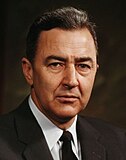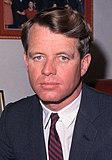| |||||||||||||||||||||||||
2,607 delegates to the 1968 Democratic National Convention 1,304 (majority) votes needed to win | |||||||||||||||||||||||||
|---|---|---|---|---|---|---|---|---|---|---|---|---|---|---|---|---|---|---|---|---|---|---|---|---|---|
| |||||||||||||||||||||||||
| |||||||||||||||||||||||||
From March to July 1968, Democratic Party voters elected delegates to the 1968 Democratic National Convention for the purpose of selecting the party's nominee for president in the upcoming election. After an inconclusive and tumultuous campaign focused on the Vietnam War and marred by the June assassination of Robert F. Kennedy, incumbent Vice President Hubert Humphrey was nominated at the 1968 Democratic National Convention held from August 26 to August 29, 1968, in Chicago, Illinois.
The campaign for the nomination began with incumbent President Lyndon B. Johnson expected to win re-nomination for a second consecutive election, despite low approval ratings following the Tet Offensive in January 1968. His only significant challenger was Eugene McCarthy, an anti-war Senator from Minnesota. After McCarthy nearly won the New Hampshire primary, Senator Robert F. Kennedy, another critic of the war and the brother of the late President John F. Kennedy, entered the race. Johnson soon announced that he would not campaign for re-election. In April, Vice President Hubert H. Humphrey joined the race as the establishment candidate; he did not criticize the administration's conduct of the war and avoided the popular contests for delegates.
McCarthy and Kennedy traded primary victories while Humphrey collected delegates through the closed caucus and convention systems in place in most states. Many other delegates were selected without a formal commitment to support any particular candidate. The race was upended on June 5, the night of the California and South Dakota primaries. Both races went for Kennedy, but he was assassinated after his victory speech at the Ambassador Hotel. At the moment of his assassination, Kennedy trailed Humphrey in the pledged delegate count with McCarthy third. Without any obligation to vote for any candidate, most Kennedy delegates backed Humphrey over McCarthy or fell behind Kennedy supporter George McGovern.
At the convention, Humphrey secured the nomination easily despite anti-war protests outside the convention center; he went on to lose the presidential election narrowly to Richard Nixon. Partly in reaction to Humphrey's victory without entering most state primaries, George McGovern led the McGovern–Fraser Commission, dramatically reforming the nomination process to expand the use of popular primaries rather than caucuses.
Cite error: There are <ref group=lower-alpha> tags or {{efn}} templates on this page, but the references will not show without a {{reflist|group=lower-alpha}} template or {{notelist}} template (see the help page).
© MMXXIII Rich X Search. We shall prevail. All rights reserved. Rich X Search





